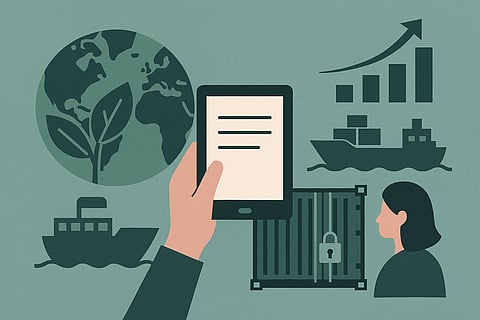Digital Documentation: Paving the Way for Fairer, Greener Global Trade
In the modern age of climate urgency and rising global trade complexities, digital documentation has emerged not just as a tool of convenience but as a vital driver of sustainable, inclusive, and efficient commerce.
With paper-based processes still dominating much of global trade—leading to delays, emissions, and inequality—digitizing trade documentation offers a way to align economic growth with environmental stewardship and social progress.
A Paper Problem in a Digital World
The global shipping industry still relies heavily on paper. According to the International Chamber of Commerce (ICC), around 4 billion trade documents are exchanged annually, contributing to an estimated 28.5 million trees cut each year just for trade paperwork.
The inefficiency is staggering: the World Bank estimates that trade documents can take up to 25% of total shipment time, slowing down supply chains and increasing carbon footprints.
Digital documentation—such as electronic bills of lading (eBLs), customs declarations, and certificates of origin—can reduce processing time from 7-10 days to just a few hours, and cut emissions by up to 40% in the documentation process alone.
Trade, Trust, and Transparency
Digital records not only reduce waste, but enhance transparency, traceability, and accountability—all key principles of sustainable trade. “Paper kills trees, but it also kills trust,” said Ngozi Okonjo-Iweala, Director-General of the World Trade Organization. “Digital documentation creates a trail of integrity and builds confidence in every transaction.”
By leveraging secure blockchain platforms and centralized trade information portals, countries like Singapore and the UAE are proving that digital systems can reduce fraud, speed up customs clearance, and improve compliance with environmental and labor standards.
A Boon for Small Businesses and Women Traders
Beyond the logistics and emissions benefits, digital trade documentation has profound implications for equity and access. According to the International Trade Centre, less than 20% of SMEs in developing countries participate in international trade due to complex border procedures and limited digital infrastructure.
Women-led businesses are especially impacted. “When documentation becomes digital, women entrepreneurs are no longer forced to travel, queue for hours, or depend on male intermediaries to file papers,” said Pamela Coke-Hamilton, Executive Director of the ITC. “It creates autonomy.”
In East Africa, for instance, the adoption of digital customs systems in the East African Community led to a 38% increase in cross-border trade by women traders between 2018 and 2022.
Challenges Remain: Infrastructure and Inclusion
Yet, full adoption is far from universal. According to UNCTAD, only 64 out of 193 countries currently have a legal framework that supports electronic transferable records. Many nations lack the digital infrastructure or political will to implement reform.
Moreover, there is a risk of digital exclusion. “We must ensure that as we digitize trade, we don’t widen the digital divide,” warned Amina Mohammed, UN Deputy Secretary-General. “Connectivity, literacy, and affordability must be at the core of trade digitalization strategies.”
Towards a Greener, Fairer Future
Digital documentation is more than an upgrade; it's an opportunity to rebuild global trade on foundations of fairness, speed, and sustainability. If scaled equitably, it could cut global trade costs by 13% (OECD), save millions of trees, and empower marginalized communities to enter the global marketplace with dignity.
In a world where every second matters and every resource counts, digitizing the documents that move goods may be one of the most human things we can do.


